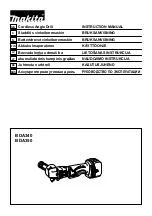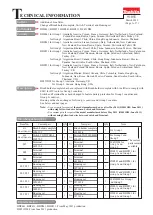
The vibration level value given refers to basic application of the tool. If the
driven too far or being damaged. Different torques should be used for
tool is used for other applications or with other tools, or if it is not
different screws and materials.
maintained properly, the vibration level may differ from the values given.
Always start with a low torque and increase gradually until the desired
The above-mentioned causes may lead to higher exposure to vibrations
result is achieved.
during the whole work time.
For drilling in metal, wood or plastic, set the ring (
2
), so that the indicator
One must implement additional safety measures to protect the operators
(
1
3
) points to symbol (
1
4
)
.
from exposure to vibrations, such as maintenance of the electric tool and
work tools, assurance of proper hand temperature, or determination of
the sequence of work operations.
n
Charging the battery
The driver is supplied with a partially charged battery. Charge the battery
fully before use. It is recommended that the first charging session lasts at
least 1 hour.
Press the battery lock buttons on both sides of the battery (
8
), slide the
battery out (
7
) of the driver (Fig.
B
) and insert into charger socket
(
1
2
)
. Connect charger to an electrical socket 230 V ~50Hz.
n
Battery charging indicator
A
green
LED light indicates that the charger is connected to a power
source.
A
red
light flashing with a frequency of about 1/s (1Hz) indicates that
charging is in progress.
Once the battery is fully charged, the red light stops flashing and both,
AUXILIARY COMPONENTS:
red and green, lights are lit continuously.
The charging current is lowered automatically as charging progresses.
After approx. 1 hour the charging current is stabilised at a minimum level
(trickle charging), which prevents battery overcharging and damage.
After charging, disconnect the charger and remove the battery.
In order to preserve battery life, avoid charging a battery that has been
only partially discharged.
IN USE:
n
Turning on/off
The switch (
1
0
) has fluid rotation speed adjustment built-in.
Press the switch to activate the power tool. The rotation speed will
increase the further the switch is pushed. To stop the power tool, release
the switch.
I
nstallation
and
removing
drills
n
Choosing rotation direction
(Fig.
E
)
The driver can work with clockwise (right) or counter-clockwise (left)
rotation.
- to select clockwise rotation, move the clockwise/counter-clockwise
To install a drill (or a working bit) in the chuck hold the lower
ring of the
slider (
3
) to the right (looking from the back of the driver),
grip (the one close to the tool body) with one hand and rotate, with the
- to select counter-clockwise rotation, move the clockwise/counter-
other hand, the upper ring clockwise to achieve locking of the
drill /bit in
clockwise slider (
3
) to the left (looking from the back of the driver),
the chuck.
When the rotation direction switch is in the middle position, it is locked.
Drills (or other working bits) must be moved to the full depth of the chuck
For drilling and driving screws in, clockwise operation should be
opening.
selected. For taking out the drill bit, removing a stuck drill bit, or
unscrewing screws, counter-clockwise operation should be selected.
n
Choosing torque
(Fig.
F
)
The driver is equipped with a ring (
2
), which can be used for setting the
toque when driving screws. The ring has 1
6
settings, from 1 to 1
5
, and a
drilling setting.
Using a given setting (from 1 - 1
5
) means that the clutch is set to an
assigned toque. This makes it possible to prevent a screw from being
n
Changing the chuck
(Fig.
G
)
1. Disconnect the battery (
7
) from the driver.
2. Open the chuck as much as possible (
1
)
PREPARATION FOR WORK:
3. Using a PH 2 (Philips No.2) screwdriver, rotate the fixing screw of the
chuck clockwise (
CAUTION!
L
eft-thread
).
4. Hold the lower chuck ring (the one closer to the driver body) and
rotate the drill/driver chuck counter-clockwise (looking from the
point of view of the chuck).
CAUTION:
A jammed keyless chuck (
1
) can be released by inserting the
short end of a hex key in the chuck and lightly tapping the longer arm of
the key (see Fig.
D
).
5. To attach the chuck, screw it onto the drive spindle counter-clockwise
(looking from the chuck side) and secure by screwing in the fixing
screw counter-clockwise using a PH 2 screwdriver (No.2 Philips). For
the chuck not to rotate during screwing in the fixing screw, the chuck
should be held by the lower ring (the one closer to the drill/driver
body).
ź
The drill/driver body includes a magnet (
9
), which makes it possible to
hold drill bits, driver bits etc. during use.
ź
The drill/driver is equipped with an auxiliary light (
1
1
) for the area of
drilling/driving, which turns on after the appropriate switch (
1
0
) is
pushed.
ź
The drill/driver is equipped with a special level/plumb indicator (
4
),
which makes it possible to place the drill bit level or plumb (Fig.
A
1
).
The tool should be placed in such a way that the air bubble is in the
middle of the upper ring of the indicator and then drilling can start. If
this is done, the drilled hole will be exactly level. When drilling is done
vertically, the air bubble should be in the middle of the back ring of the
level vial (
4
).
n
CAUTION:
Disconnect the battery from the driver or put the rotation
direction switch (
3
) in the middle position to secure the machine from being
started by mistake, which could in turn cause harm to the user.
1.
(Fig.
C
)
To remove a drill (or a working bit) from the chuck
hold the lower ring of
the grip (the one close to the tool body) with one hand and rotate, with
the other hand, the upper ring anticlockwise to enlarge the chuck
opening.
n
Drilling boreholes
To drill deep boreholes carry out your job gradually, drill to lower
depths and remove the drill from the borehole from time to time to
remove borings from the borehole.
6
Summary of Contents for TUV12B
Page 2: ...9 3 5 7 2 11 A E 3 3 9 5 10 8 7 2 3 6 4 1 4 F 2 13 14 G 2 15 1 1 B 9 3 5 7 7 8 C 12 7 D 1...
Page 14: ...RCD TUV12B TUV14B TUV18B 14...
Page 15: ...15 a a...
Page 16: ...a a 40 15 25 C 30 H 16 Ni Cd...
Page 19: ...19 5 PH 2 Philips 2 n n 9 11 10 4 A1 4 n n 3 1 2 3 4 34 03 228...
Page 20: ...20 PROFIX...
Page 51: ...51...
Page 52: ...www profix com pl...







































